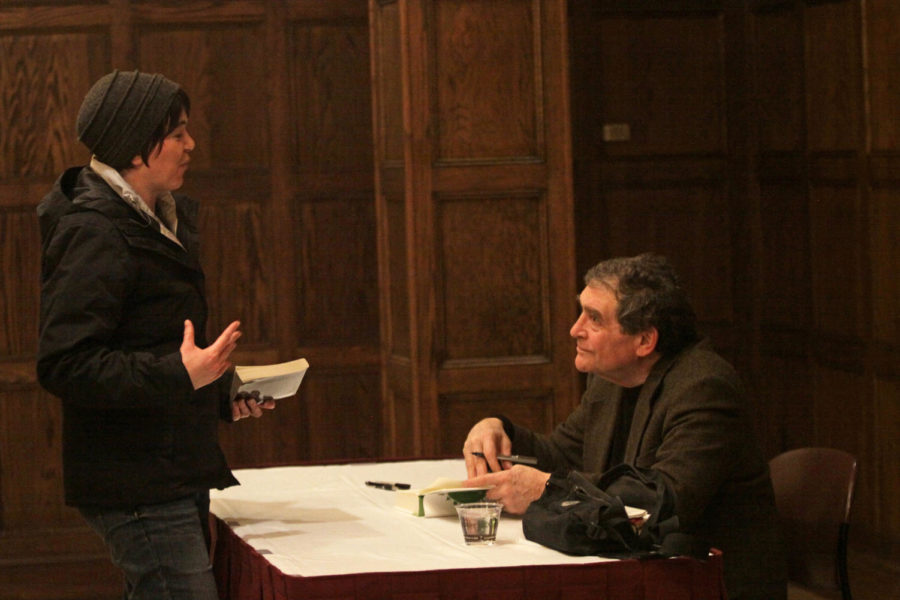Alan Weisman presents issues of overpopulation, sustainability
Korrie Bysted/Iowa State Daily
Meg Brown, graduate student in English, speaks with Alan Weisman while he signs her book after his lecture on sustainability Monday, Feb. 24, in the Great Hall.
February 25, 2014
After traveling to more than 20 countries, Alan Weisman found insight on how to achieve a more stable population and solve the problems of overpopulation how to ensure prosperity in the future.
Weisman’s new book, “Countdown: Our Last, Best Hope for a Future on Earth?” addresses the issues of overpopulation and sustainability in our world.
“Part of human nature is to make more copies of ourselves,” said Weisman.
He said that it is only in our nature to want to reproduce, but the more people there are, the more we need to figure out how to feed them.
Population is increasing by two ways Weisman said. More people are born than dying, and more people are living longer.
By the end of the century, the world population is predicted to be 11 billion, Weisman said.
Weisman believes that we either have to take action and try to manage it gracefully, or nature will take its course and do it for us. He said that the most important resource is the use of contraception and education for females. He believes that if we fail to provide contraception every two and a half days there will be more and more starving children.
He said that by strongly supporting contraception and education for females around the world there will be one billion fewer of us by the middle of the century.
Bringing our population down to a truly sustainable amount rather then figuring out how to feed everyone in the future is much more realistic, Weisman said.
China’s one child policy lowered their population by 400 million people but Weisman said he realizes that using this plan would be unrealistic.
The rapidly rising number of people on this planet is changing the world chemically, carbon dioxide is increasing causing it to warm Weisman said.
Weisman decided to use his last book as the initial inspiration for his newest book. He explained that his inspiration was finding a happy medium between allowing our population to disappear by over regulating birth and not regulating population at all.
Nicholaus Jackosky, junior in global resource systems, attended the lecture because he is part of the executive board for Green Umbrella. He enjoyed the lecture a lot and thought it was a simulating conversation.
Mckenzie Robinson, junior in communication studies, attended the lecture as a member of the student club Greeks Go Green. Robinson said the lecture was very interesting and agrees with Weisman that overpopulation is a huge issue. She said Weisman seemed very well educated on the issue
“I definetly think reducing demand through the measures he talked about would be a really good way to help stop a lot of pressures we have on agriculture and the environment,” said Jackosky.
He also said that doing things Weisman’s way might be smarter and less extreme than letting the world come to terrible epidemics or people starving to death.







